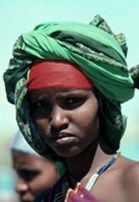|
|
The Tunni of Somalia are part of the Digil group, a sub-group of the Somali, the largest ethnic group in the country. The Tunni speak Af-Tunni from the Afro-Asiatic language family and some also speak Arabic as a secondary or trade language. They share similarities in culture, language and religion with the Afar and the Beja.
Many Tunni reside near the Juba and Shebelle Rivers in southern Somalia and are active in farming and agriculture. Bananas are the chief commercial and export crop; however, sugarcane, corn, beans, sesame and fruit are also grown. The Tunni men work through a system of mutual “help work parties,” overseen by a chief, who then sends the men out to work on special “work days.” The men are paid a fee and fed for their efforts. Although women are not members of the work groups, they help the men by either grinding grain for flour or herding cattle or camels, which provide milk, meat and skins.
The Tunni live in round huts that have mud walls and cone-shaped grass roofs; the wealthier families may have a porch attached to their hut. The inside of the hut is divided by a partition; the man sleeps near the door, while the woman sleeps near the back of the hut. Because the Tunnis are nearly one hundred percent Muslim, under Islamic law each man is allowed up to four wives; however, each wife and her children have their own hut.
The Tunni wear mainly cotton cloth and the dress resembles that of a gray or white Roman toga. The cloth is often saturated with butter in order to protect the individuals against the cold.
When a man desires to marry, he must pay a bride-price to the woman’s parents. If this gift is accepted, the two marry and the wife comes under the care of her husband as well as all the members of her husband’s family. If the wife is murdered, blood-vengeance may be taken by the husband and his family.
Although the Tunni are Muslim and are orthodox in their religious practices, few have a deep understanding of their faith. Although they believe that Jesus was an important prophet, many Tunnis think of Christians as inferior to themselves.
The Tunni have no Christian resources available to them. The majority have never had the opportunity to hear the gospel. Pray that God’s light and love will penetrate the darkness. Pray that the reality of Jesus Christ will grip the hearts and lives of the Tunni.
For more information on the Tunni of Somalia, visit:
http://kcm.co.kr/bethany_eng/p_code5/2529.html
www.ethnologue.com/show_language.asp?code=tqq
(Information compiled from www.joshuaproject.net)
(Note: The website links above are intended to provide you with more information about this people group. Some of the links are to groups that are not religious in nature but who provide information and background that may be helpful in researching this people group. The content of each of the websites linked to is the sole responsibility of the linked-to organization. Views expressed on these websites do not necessarily reflect the opinions and beliefs of the staff or writers of Lausanne World Pulse or those of the Lausanne Committee for World Evangelization, Institute of Strategic Evangelism, Evangelism and Missions Information Service or Intercultural Studies Department.)


